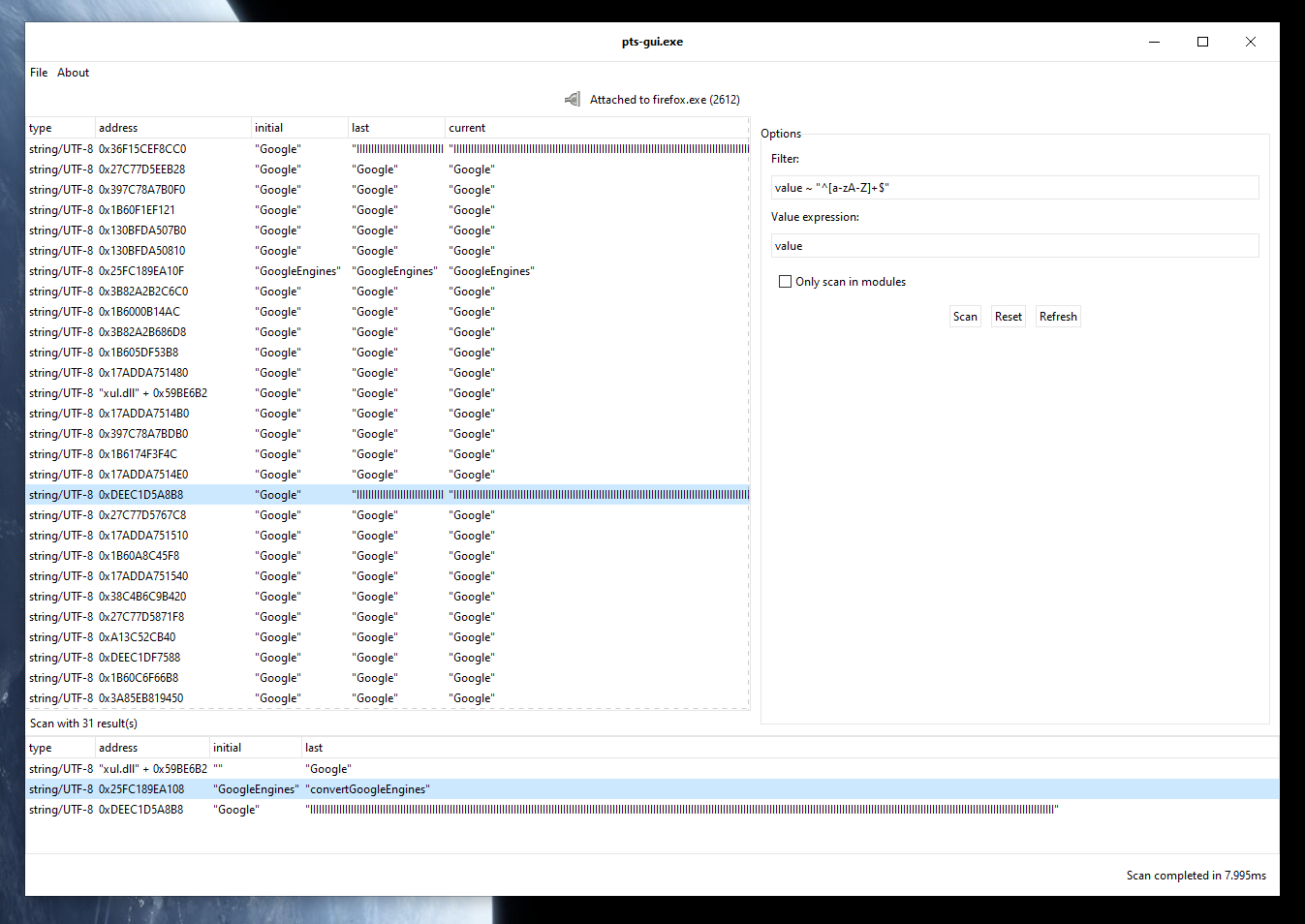A memory scanner for Windows, written in Rust.
ptscan is a cli tool which allows you to scan and dissect memory using filters.
These filters are used in commands such as scan and watch.
All expressions support the following types:
none- The specialnonetype. Any value of this type is undefined. See the section below for more details.pointer- A pointer value, who's size depends on the process being attached to.u8- An unsigned 8-bit number.i8- A signed 8-bit number.u16- An unsigned 16-bit number.i16- A signed 16-bit number.u32- An unsigned 32-bit number.i32- A signed 32-bit number.u64- An unsigned 64-bit number.i64- A signed 64-bit number.u128- An unsigned 128-bit number.i128- A signed 128-bit number.f32- A 32-bit floating point number.f64- A 64-bit floating point number.string- A null-terminated string with the default encoding (utf-8).string/<encoding>- A null-terminated string with the specified<encoding>, as per the whatwg Encoding standard.bytes- An unsized byte array.bytes/<len>- A byte array of length<len>.
The none type is a special type which any value can assume.
Any comparison (==, !=, <, >, ..) except value is none or value is not none is false.
Any expression (+, -, *, /) involving a value of the none type results in another none type.
For example, *value + 1 would be none if *value is not a valid pointer.
A value of type none still retains the old type information to make sure it can be successfully refresh if needed.
Therefore you'll see things like:
none(u128)Which means that an expression which was expected to evaluate to a u128 value, evaluated to none.
Value expressions resolve to a specific value in memory. The take the following forms (the earlier it is listed, the higher its precedence):
value- The current as-we-are-scanning value of the memory location.initial- The initial value of the memory location, from the initial scan.last- The last value of the memory location, from the previous scan.<number>- A whole number literal. Default type isu32.- Example:
42
- Example:
<decimal>- A decimal number literal. Default type isf32.- Example:
42.42
- Example:
<string>- A string literal. Default type isstring/utf-8.- Example:
"ui_boot"
- Example:
(<value>)- Override default precedence.*<value>- Dereference the given value. This treats it as an address and follows the pointer.- Example:
*value
- Example:
&<value>- Take the address of the given value. not every value has an address, like&(value + 42)is not valid.- Example:
&value - Example:
*(&value + 0x40)
- Example:
<value> as <ty>- Explicitly treat the value of<value>as the type<ty>.- Example:
value as u64 - Example:
value as u128 == 1
- Example:
<value> * <value>- Multiply two values from each other.- Example:
value * 42
- Example:
<value> / <value>- Divide two values.- Example:
value / 42
- Example:
<value> + <value>- Add two values together.- Example:
value + 42
- Example:
<value> - <value>- Subtract two values from each other.- Example:
value - 42
- Example:
Test if <a> matches the regular expression specified in <b>.
Checks that <a> is equal to value <b>.
For the initial scan, this allows for the following optimization:
value == 42- scan in batches for the exact memory pattern of42
Checks that <a> is not equal to value <b>.
For the initial scan, this allows for the following optimization:
value != 0- scans for non-zero memory addresses.
Checks that <a> is less than value <b>.
For the initial scan, this allows for the following optimization:
value < 0- scans for non-zero memory addresses.
Checks that <a> is less or equal to the value <b>.
For the initial scan, this allows for the following optimization:
value <= 1- scans for non-zero memory addresses.
Checks that <a> is greater than the value <b>.
For the initial scan, this allows for the following optimization:
value > 0- scans for non-zero memory addresses.
Checks that <a> is greater than or equal to the value <b>.
For the initial scan, this allows for the following optimization:
value >= 1- scans for non-zero memory addresses.
This project bundles Adwaita icons parts of the GNOME Project under the Creative Commons Attribution-Share Alike 3.0 license (see [licenses]).
You can find them at http://www.gnome.org
